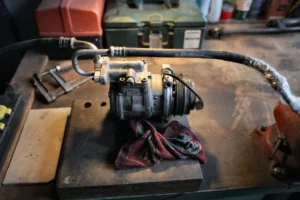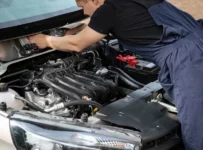
The air conditioning compressor is an essential part of your vehicle’s HVAC system. It is the device that pumps refrigerant through the car’s evaporator and condenser to regulate cabin temperature.
If it fails, you will experience a lack of cold air from your AC system. But what about when the AC compressor starts to go bad? Will a bad ac compressor affect the engine performance? Keep reading below to find out!
What Is An AC Compressor?
An AC compressor is a device that helps circulate refrigerant in your vehicle’s air conditioning system. The compressor is driven by the engine and pumps refrigerant throughout the system.
When the compressor turns on, it forces refrigerant to flow through the condenser, cool, and turn into liquid form. From there, the liquid refrigerant flows into the evaporator, where it absorbs heat from the air inside your vehicle.
The AC compressor then blows this cooled air into the cabin to keep you and your passengers comfortable. Without the compressor, your air conditioning system would not work.
If you’re experiencing problems with your AC compressor, have a certified technician inspect it for possible repairs. Failing to properly maintain your AC compressor can lead to more serious problems down the road. For example, a seized compressor could damage other parts of the AC system and cost you more in the long run.
Often an AC compressor will fail because of a faulty bearing or mechanical problem, but it can also result from something as simple as low refrigerant levels. If your air conditioning is blowing warm air, you could have a leak that needs locating and repair before further damage occurs.
If your vehicle’s AC compressor is not working, don’t despair. You can do several things to stay cool until it’s fixed. One option is to use a portable AC unit or window fan to circulate the air in your vehicle. You can also roll down the windows and let the breeze flow through.
Whatever you do, don’t drive around without air conditioning. Even if you have the windows down, temperatures inside your vehicle can reach dangerously high levels in a very short period.
Will A Bad AC Compressor Affect The Engine?
Yes, a bad AC compressor will affect the engine. You might not notice it right away, but over time the engine will suffer damage from a bad AC compressor in addition to increased fuel consumption and higher emissions levels.
The hotter the ambient air (the temperature outside), the more power your AC needs to cool you down, so be sure to check that your car’s cooling system is working correctly before heading out for that summer road trip.
The compressor is what pressurizes the refrigerant in the system. If it’s not working right, the whole system will be affected. You may also notice a decrease in power or fuel economy. A bad compressor can cause problems with the engine, so it’s essential to get it fixed as soon as possible.
Signs Of A Bad Or Failing AC Compressor In Your Car
Here are some other signs that you might need a new AC compressor:
Higher temperatures than usual:
If you notice that your car is running hotter on the freeway or in stop-and-go traffic than it used to, then this might be a sign of a failing compressor.
If the temperature gauge goes up above normal operating levels and does not return down when you take evasive action (e.g., slowing down), then there could be a problem with the compressor.
Loud Noise:
If you hear a loud noise when the AC is turned on, it could indicate that the compressor is failing. A bad or failing AC compressor can make all sorts of weird noises, from squealing to grinding to hissing. If you hear any strange sounds coming from your car’s AC system, it’s time for a diagnostic checkup.
Leaking fluid:
If you see a puddle of fluid near your car and you’re not sure where it’s coming from, take a look at the AC system. If there is any leakage around the compressor, that’s an issue that needs addressing.
A failed seal usually causes the leak, and it can be hazardous to drive your car if the compressor is leaking fluid.
Poor performance:
If your AC system is not working as it should, and you notice that it’s not providing the same level of cooling or heating as before, then there could be a problem with the compressor.
If this happens to you on a hot day while driving down the freeway, make sure to pull over immediately so that you can address the issue. You will also notice that your engine will be working harder than usual.
Compressor clutch not moving:
If you notice that the clutch of your AC compressor is not moving, then this might be a sign of damage or an impending failure. It’s essential to get any issues with the clutch checked out by a professional as soon as possible.
Damaged wire:
If you notice a damaged wire in the AC system, it might be time to replace your compressor. This can happen due to driving through puddles or submerging the car underwater.
That’s why most mechanics recommend keeping at least an inch of clearance between your engine compartment and any standing water when possible.
Broken Suction Lines:
If the suction lines that run from the compressor to the evaporator are damaged, it can cause a loss of refrigerant and affect the performance of your AC system. This is another repair that should be handled by a professional as soon as possible.
Circuit Breaker Tripping:
If the circuit breaker for your AC system keeps tripping, it’s a sign that there is too much load on the compressor, and it needs replacing. This can happen if there is a leak in the system or if the condenser is not working correctly.
Diagnosing A Bad AC Compressor In Your Car
AC compressors are responsible for supplying the cooling air to your car’s cabin area. If it isn’t working, you will start experiencing hot weather conditions inside your vehicle and make many noises coming from underneath your hood. So below is a list of a few steps that can help diagnose whether or not there is an issue with the Air Conditioning compressor.
The first thing to do is listen to the air conditioning system in your car and determine if it is working or not. The best way would be by starting up the engine of your vehicle, turning on the AC switch, then putting off all other electrical accessories inside the car that can affect hearing, such as playing music with headphones, etc.
When you are sure that the AC is working, turn off your car’s engine and go under it. The compressor will be on your left-hand side while looking frontwards towards to rear of the vehicle. Then check if there isn’t any water dripping from it or oil leaking out from somewhere underneath.
This would mean that there must have been a leak in your AC system, and there is something wrong with the compressor. The second thing to do will be to check if the compressor has been freezing on its own. This can cause significant damage to your car and other systems such as the A/C evaporator, condenser, or even electronic components inside it.
The next step would be to check the pressure of the AC system. To do this, you will need to purchase a gauge set from an auto parts store and connect it between the high-pressure side and low-pressure side fittings on your car’s A/C compressor.
Turn on the engine and AC switch while monitoring the gauge readings. If there is a high-pressure reading, then check the compressor for damage. If it is working fine, you have to find out what’s causing high pressure in your system and fix this issue before repairing or replacing the compressor unit itself.
The next thing would be by looking at the clutch on the AC compressor and around its belt pulley. There could be an issue with it causing a lot of noises and vibrations coming from the compressor unit itself, which might indicate that there is something wrong internally.
If you hear any kind of rattling sounds, check for water damage at its belt pulley first by removing it and cleaning off all debris or foreign materials.
If there doesn’t seem to be an issue with the AC compressor after covering all the steps above, then it is most likely that the problem is elsewhere in your car’s A/C system. So take it to a mechanic and get it diagnosed so that he can help you fix the entire system.
Conclusion
If you notice any signs of a bad or failing compressor, it’s best to have the system looked at by an experienced mechanic as soon as possible. If left unchecked, your AC problems could lead to more significant issues down the line.
A broken compressor can lead to cooling power, poor performance, and even engine failure. In addition, there might be instant repairs that need doing right away to get your car back up and running.


